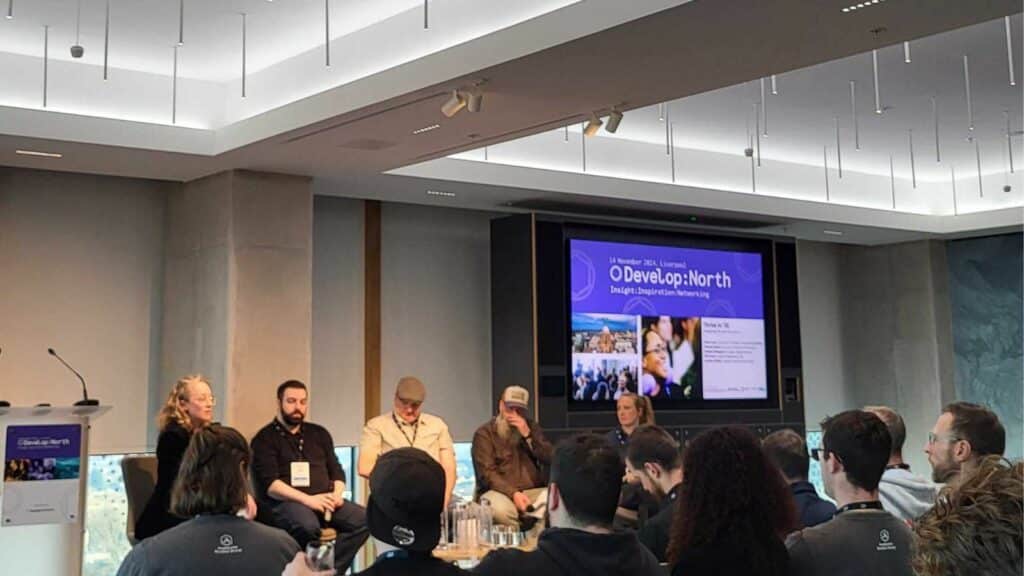One of Europe’s major events for game developers, The Develop Conference, officially launched in Liverpool for 2024 to unite games leaders and emerging talent from across the North and beyond for a day of industry insights.
Hosted at The Spine in Liverpool’s Paddington Village on 14 November, the expansion of this event from Brighton to the North saw Develop:North bring a packed programme covering anything from diving into the dialogue on Helldivers II with PlayStation Studios, to an overview of business and marketing strategies within the games industry.
Cllr Nick Small, Liverpool City Council’s Cabinet Member for Growth and Economy, said he is “delighted” the city hosted Develop:North 2024 as it “puts the spotlight on how much is happening in the city in this hugely important sector”.
“We’re very proud of the fact Liverpool is home to major players like PlayStation and Tencent, alongside dynamic indie studios that have developed successful titles such as The Queen’s Gambit Chess, Wipeout Omega Collection, PlayStation VR Worlds, and Combat League, to name just a few recent critical and commercial successes.”
There were a number of Liverpool-led sessions at the conference too, including a keynote session with Alan McDermott, Jo Daly, and Nigel Kershaw from Wushu Studios on ‘Building a Positive and People-first Future for Game Development’.
‘Thrive in ‘35’ was a standout panel session, bringing together leaders from the Liverpool City Region Games Board including co-chair Alison Lacy; Clemens Wangerin, founder of Digital Advisors; Phil Owen, head of engineering at d3t; Tom Owens, lecturer in Game Design at the University of Liverpool; and Caroline White, a creative industries specialist.

Hosted by Lacy, the panel addressed how there is still a “lack of stability” in the industry. But with the global games market set to grow beyond £187bn post 2024, the leaders debated how the region can capitalise on that growth over the next 10 years.
Skills were a hot topic. The panel discussed how there needs to be more involvement from education providers and the industry needs to “embrace” new ideas outside of universities for it to move forward and improve diversity.
As there is a big focus from the industry on specific skills, Wangerin said he would “love to see” more emphasis on entrepreneurial thinking as it can bring “fresh thinking to the table”.
Collaboration is key in the North, explained White, and if more digital and creative businesses across the wider ecosystem united to talk about those shared skills challenges it will help make the sector “richer”.
With a games dev network in Liverpool, there needs to be more help to formalise those networks to “keep it moving”.
With the competitive barriers breaking down and more collaboration between studios across the region too, this “filters through to the wider ecosystem and can be powerful,” added Phil Owen.
But investment in Liverpool’s games sector and the North hasn’t always been there, with many leaders still having to travel down to the South for funds despite almost 80% of all games development emerging outside of the capital. “Invest in Liverpool,” urged Tom Owens.
“Representation matters and visibility is key for young talent,” he added.
On the government’s involvement in growing the games sector in the North, Wangerin said there is widely support in the form of R&D tax credits and access to SEIS investment but there is “always room for improvement”.
Being part of an ecosystem with a combined authority which has more devolved power is “incredibly important” he added, and ultimately that leads to “stronger clusters” and better support for both mentorship and entrepreneurship.
But for No.10 Downing Street to take notice of what’s happening outside of London, there needs to be a “stage” for both the creative industries and games sector to showcase what they do. In Liverpool, “lots of change is happening on goodwill” explained Lacy, who argued there is a need for games industry figureheads for the government to champion and be “excited” about.
In Liverpool, there needs to be more of a “shouting from the mountains attitude” about all the titles and work emerging from the region, urged Phil Owen, with recent successes including The Queen’s Gambit Chess developed by Ripstone Studios to Horizon Call of the Mountain, developed by Guerilla Games and Firesprite Studios.
But the “big opportunity” lies in the importance of technology emerging from the games sector and how it is revolutionising other industries such as healthcare.
As for the future for the games sector in the North West over the next 10 years, there are more connections forming and there will be a greater emphasis on trust and reputation especially when it comes to co development, said Wangerin.
“There is lots of work being done for us to deliver together.”
Designed and delivered by Tandem Events, Develop:North 2024 is supported by Liverpool City Council’s Business Support Service through the UK Shared Prosperity Fund, with the Liverpool City Region Combined Authority as the lead authority.










